Recycling batteries is essential for a healthier planet. First, identify the type of battery you're recycling—alkaline, lithium-ion, lead-acid, or nickel-cadmium. Remove them from devices and cover the terminals with non-conductive tape. Store them in a cool, dry place until you can drop them off. Look for recycling locations at home improvement stores or office supply retailers, or use resources like Call2Recycle. Avoid improper disposal, as it harms the environment and risks fines. By following these steps, you're contributing to eco-friendly practices, and there's even more to discover about responsible battery disposal methods.
Key Takeaways
- Identify the type of battery you have and follow specific recycling guidelines for each type, such as lithium-ion or lead-acid.
- Remove batteries from devices, cover terminals with tape, and store them in a cool, dry place to prevent leaks.
- Locate nearby recycling drop-off locations at home improvement stores, office supply retailers, or use online resources like Call2Recycle.
- Participate in mail-in recycling programs for lithium and rechargeable batteries offered by companies like Cleanlites.
- Follow local regulations for hazardous waste disposal and attend collection events to ensure safe battery recycling.
Importance of Battery Recycling
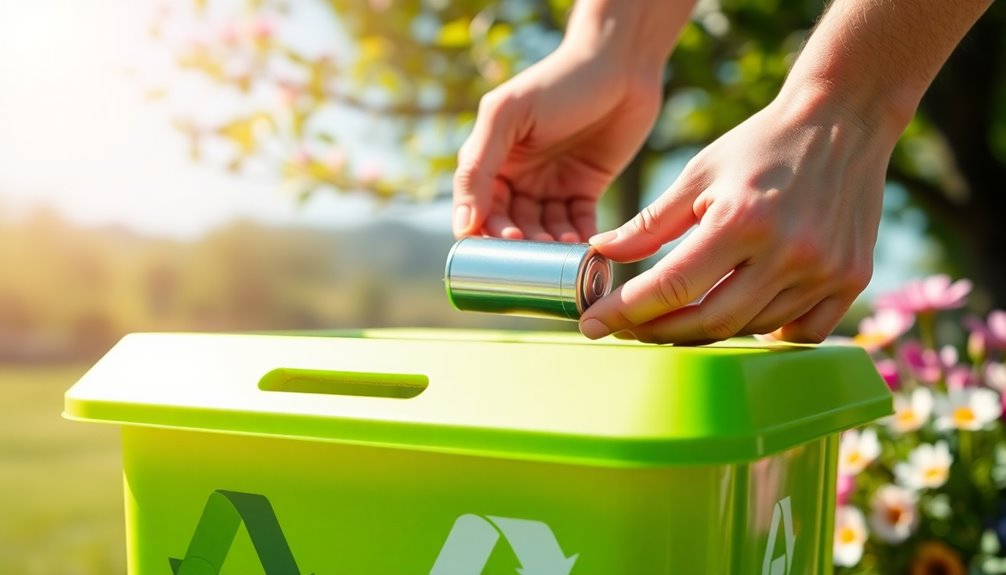
Battery recycling is essential not just for protecting the environment, but also for safeguarding your health. Improper disposal of batteries releases toxic chemicals like lead, cadmium, and mercury into soil and water, posing risks to both ecosystems and your well-being.
By participating in recycling programs, you help reduce the 180,000 tons of battery waste generated annually in the U.S. Recycling batteries conserves valuable materials such as lithium and cobalt, greatly cutting down on raw material extraction and energy use.
Responsible battery disposal not only minimizes hazardous waste but also supports community health by lowering pollution. Engaging with local recycling centers fosters environmental stewardship, ensuring a cleaner, safer environment for everyone.
Your actions can make a real difference!
Types of Batteries
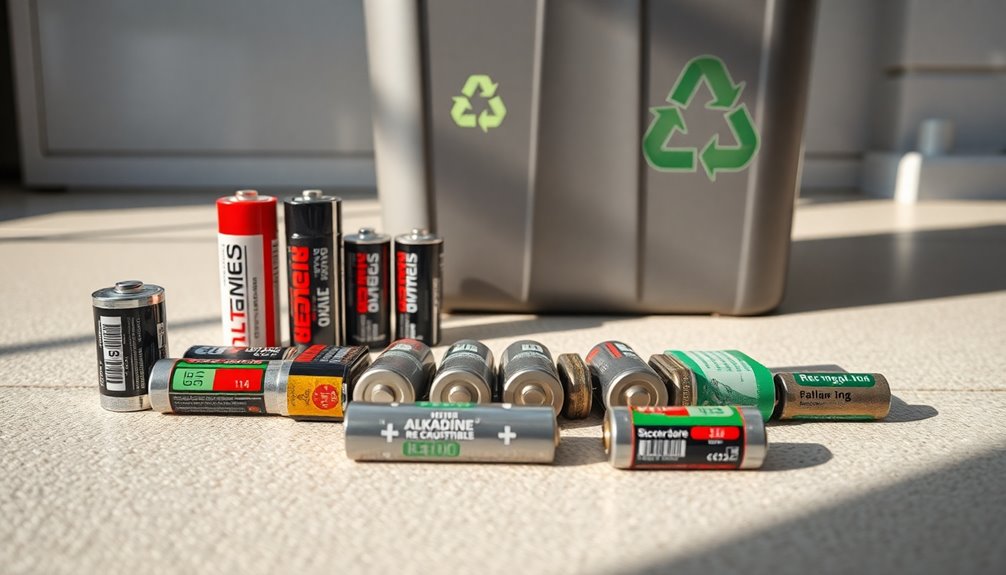
Various types of batteries power our everyday devices, and understanding their differences is essential for responsible recycling.
Alkaline batteries for recycling, like AA and AAA, are non-hazardous but should still be recycled to protect the environment.
Lithium-ion batteries, often found in smartphones and laptops, require special handling due to fire risks, so make sure to take them to designated recycling facilities.
Lead-acid batteries, used in vehicles, contain toxic lead and must be recycled properly—many auto retailers will accept them.
Nickel-cadmium batteries, common in power tools, also need special disposal methods because of their carcinogenic cadmium.
Finally, consider rechargeable batteries for recycling, such as nickel-metal hydride and lithium-ion, which are eco-friendly and recyclable at facilities like Call2Recycle.
Preparing Batteries for Recycling
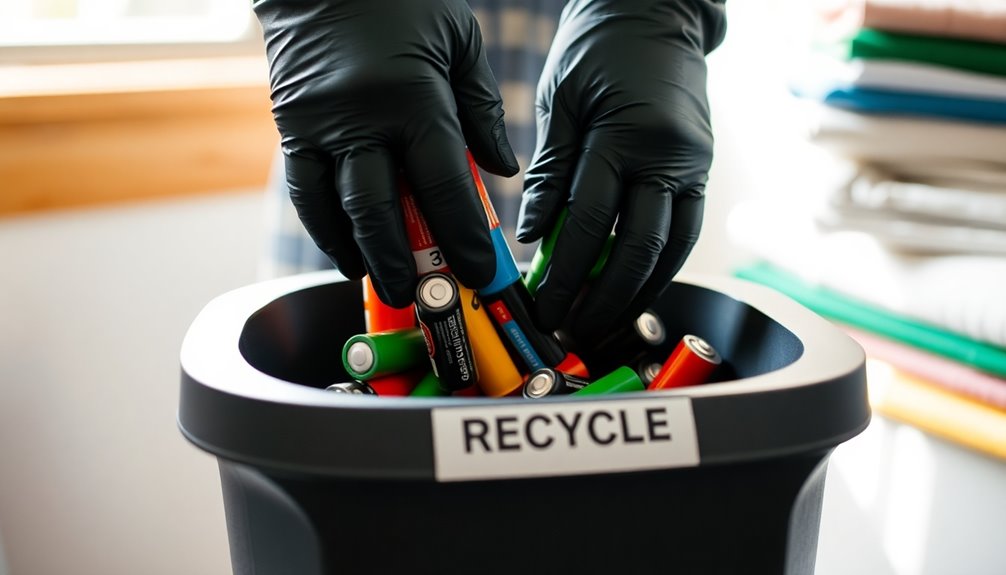
To guarantee a safe and effective recycling process, you should take a few simple steps when preparing batteries for recycling.
First, remove batteries from electronic devices to prevent damage and leakage during transport.
Next, cover battery terminals with non-conductive tape, especially for 9-volt batteries, to reduce the risk of short-circuiting.
Store batteries in a cool, dry place until you can recycle them, as extreme temperatures can cause leakage or fire hazards.
Be sure to separate rechargeable batteries from single-use ones to assure proper battery disposal at the recycling center.
Finally, dispose of batteries from dead electronic devices separately to comply with recycling regulations and prevent contamination.
Following these steps helps make recycling smoother and safer.
Recycling Locations
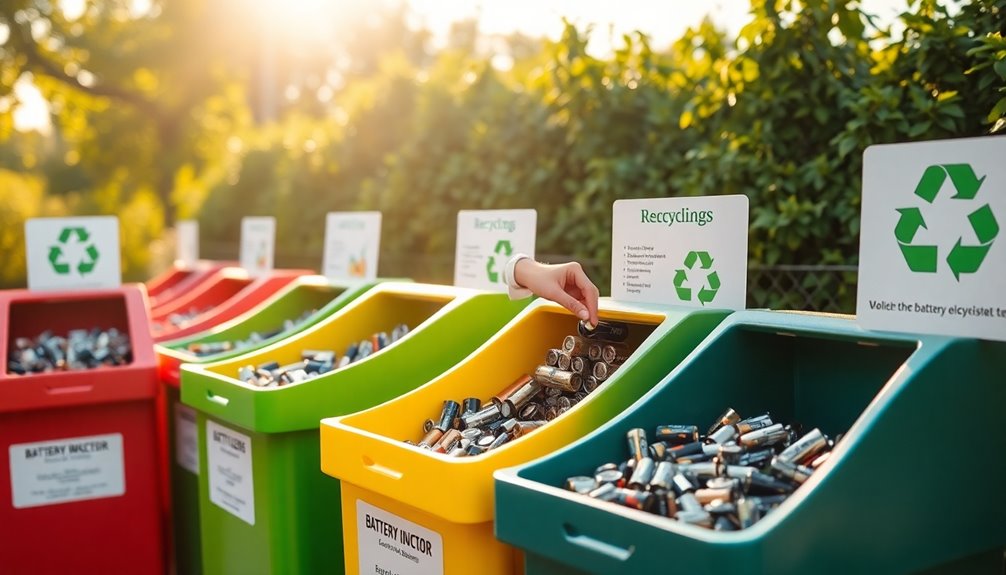
Once you've properly prepared your batteries for recycling, it's time to find a suitable location for disposal.
Many local home improvement stores, like The Home Depot, offer battery recycling drop-off programs. Office supply retailers, such as Staples and Office Depot, often have designated recycling bins for your convenience.
For more options, use online resources like Call2Recycle to locate nearby recycling centers. If you prefer to recycle from home, consider mail-in programs from companies like Cleanlites, which specialize in lithium and rechargeable battery recycling.
Additionally, check with your municipal waste management for hazardous waste collection days, where you can safely drop off batteries and other harmful materials.
Consequences of Improper Disposal
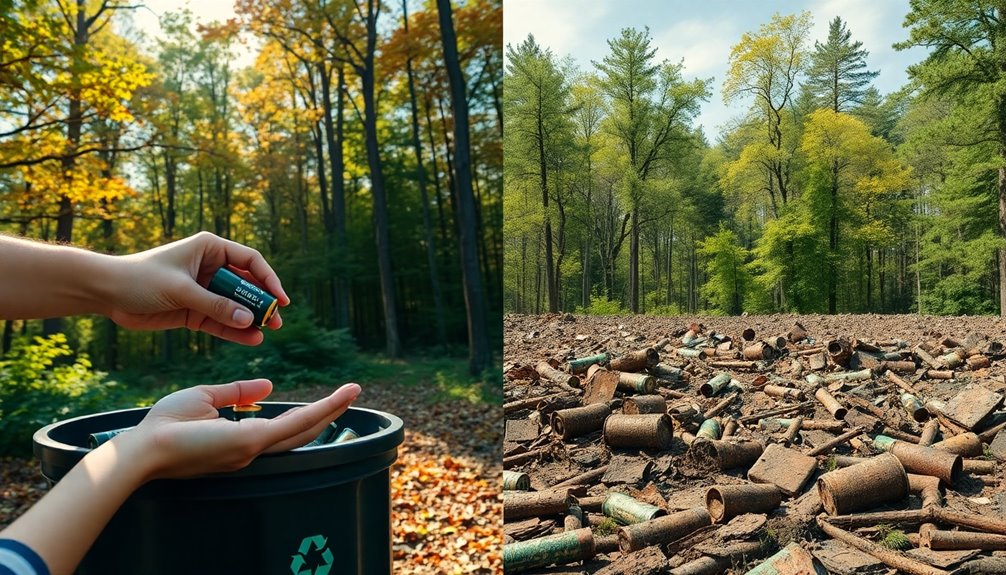
Improperly disposing of batteries can lead to serious environmental and health consequences that you mightn't consider. Each year, over 180,000 tons of hazardous battery waste contributes toxic substances like lead and mercury to the environment.
These chemicals leach into the soil and groundwater, threatening human health and ecosystems through the food chain. Additionally, when batteries are burned, they release harmful gases that pollute the air, causing respiratory issues for those nearby.
Wildlife also suffers as toxic substances accumulate, leading to health problems and declining populations. Not to mention, failing to follow local disposal regulations can result in fines.
It's essential to utilize proper battery recycling services to prevent these harmful outcomes and protect our environment.
Frequently Asked Questions
How Are Batteries Recycled Step by Step?
To recycle batteries, you start by finding a designated recycling center or drop-off location.
Once you drop them off, the batteries are sorted by type to guarantee safe processing.
Then, they're crushed and the materials are separated.
Valuable metals like lead and lithium are recovered and refined.
Finally, these materials are reintroduced into manufacturing, reducing the need for raw resources and minimizing environmental impact.
It's a vital step for sustainability!
How Do You Prepare Batteries for Disposal?
Before you toss those batteries aside like forgotten treasures, take a moment to prepare them for proper disposal.
First, remove them from devices to avoid damage. Cover terminals with non-conductive tape, especially on 9-volts, to prevent shorts. Store them in a cool, dry spot, away from sunlight.
Finally, sort rechargeable from single-use batteries, and check your local regulations to verify you're disposing of them responsibly. Your efforts can make a big difference!
What Is the Disposal Method for Batteries?
When it comes to battery disposal, you need to know the type of battery you're dealing with. Alkaline batteries can often go in the regular trash, but rechargeable and lithium-ion batteries require recycling at designated facilities.
Always cover the terminals with non-conductive tape to prevent short-circuiting. Check local stores for drop-off programs and use resources like Call2Recycle to find recycling centers near you and understand your area's regulations.
How Are AA and AAA Batteries Recycled?
When you recycle AA and AAA batteries, they're taken to specialized facilities where workers break them down.
They extract valuable materials like zinc, manganese, and steel, which can be reused in new products.
By recycling these batteries, you help prevent harmful heavy metals from entering landfills.
Many retailers offer drop-off bins, making it easy for you to dispose of used batteries responsibly while supporting eco-friendly practices in your community.
Conclusion
Recycling batteries is essential for protecting our environment, and it's easier than you might think. Remember, "One man's trash is another man's treasure." By properly disposing of your used batteries, you're not just preventing pollution; you're also contributing to a cycle of sustainability. So, take a moment to prepare your batteries and find a local recycling location. Every small action counts, and together we can make a big difference for our planet's future!










